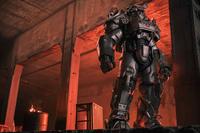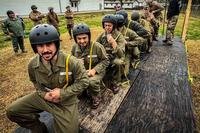BY NATHAN WERTZ - THISANDTHATTECH.COM
Jim Brumbaugh, Army veteran who worked on Blackhawk Helicopters (67 Tango), is a Lab Technician for Crucial (subsidiary of Micron Technology) in Boise, Idaho, which creates consumer products like PC memory, solid state drives, and other accessories. Jim shares his military transition with us and sheds some light on what he has learned along the way.
Can you give us a bit of background on where you grew up and what life was like for you?
I grew up in the northwest. My dad moved around, we all moved around quite a bit, but wound up in Idaho, Boise, Idaho, to be exact. One of five kids, so it was every man, woman, and child for themselves. I lived, so I ate very well.
Joined the military when I was 20.
What branch did you join and was there a particular reason you selected that branch?
Well, it was kind of interesting. That’s a good story. I went in the Army in aviation side. I wasn’t a ground pounder. I went to work on Blackhawk Helicopters; 67 Tango was my MOS. I went down to the recruiter's office and I was going to go into the Air Force. Strangely enough, they were closed that day, so I went next door to the Army and they were open.
When I was going into the military, I wanted to pick something that I could do when I got out. In other words, it wasn't something that was gonna be 11 Bushwhacker or infantry-wise or anything like that, even though they've got a lot of MOS that really could be used on the outside. But I wanted to go into something like aviation or computer technology, that kind of thing.

Any stories from your time serving or lessons learned?
I've got a few. Officers are great.
For the most part, Basic Training is something that you have to go through to get to the other side. So whatever you do when you go into Basic Training, remember everything they teach you can't be learned from the front leaning rest position. When you go to your duty stations, by all means, make sure that you pay particular attention of all the information, everything they tell you.
But I think the biggest thing that I have learned from the military was just to have fun with what you're doing. No matter where they send you, whether it's a hardship tour like in South Korea or whether it's somewhere in the states, Alaska, Texas, wherever, just to embrace it, have fun, enjoy the culture, and just to experience everything that you have around you.

Looking back, how do you feel about your time in service?
I don’t feel any different, basically. Like I told a buddy of mine, I would take a bullet for any American out there and I still feel the same way, regardless of who you are. When I enlisted to serve, it was to defend the Constitution and the freedom of the people, in general. It's even more, I think, nowadays, more dangerous for people actually going into the military than it was back when I was in. Desert Storm just was beginning and so the threat wasn’t as high as it is now.
How many years did you serve?
I served five years.
Desert Storm. So when did you enlist?
Actually, I enlisted March of '88 and got out in '94, March of '94.

What was your path after exiting military service to your current position at Crucial?
Yeah, that was fairly interesting. I worked a lot of different places. Basically, I got out and a friend of mine said, hey, come to Ogden, Utah, work over there with me for a little bit, and I did for about a year. Got away from that because it wasn’t really what I was looking for.
I did not get my Airframe and Powerplant licenses, which I could have done being a helicopter mechanic, but I didn’t. So I went from job to job, did some sales a little bit, owned my own business for about six to eight months, and then I finally wound up at Micron/Crucial just over the course of, I'd say, five, six years of just bouncing from job to job, trying to find something on the outside that would be suitable or that I'd like.
How did you feel going into the civilian job market? From previous interviews I've done, one of the reoccurring themes is that many veterans feel that civilians aren't as committed to the "mission" as they are. Any parallels to that?
Yeah, there were some reservations there. I mean, yeah, you get stuck in a mission mode. And it's not really a mode; it's actually a way of life. And you see other people around you that don’t take it as seriously as you do or don’t take it in the context that we look at it.
So yeah, I felt kind of like an outsider looking in, you know? I did find some ex-military that were actually working as well there, so I was able to relate to them a lot better than I would to just somebody who is a civilian or who had never been in the military. So yeah, it was a little hard because of the lingo and the things that you had to kind of work through.

I keep hearing the same thing in regards to the mission. I guess it never hit me that that is a lot of it, maybe the commitment to the mission itself.
Well, if you think about it, I mean you're trained from Basic Training all the way through to your duty stations that you’re a team, that you work as a team, and that it's a mission. It's a mission that you have to accomplish. So those who are very task-oriented are people that need to find jobs that are very task-oriented. Otherwise, they're gonna be floundering around out there. But it is the mission. And I think when you get out, you need to find a job or you need to find a position or find a career within the company that has a mission.
What is your current position at Crucial and how would you describe it to a layman?
I'm a lab technician. And if somebody was to ask what a lab technician does, I would tell them that I take the memory that comes back -- see, I work on the RMA side, the return material authorization or the return material side.
So our lab gets shipped in product that is either opened or damaged and we test it for functionality to make sure that it still does everything that it's supposed to, functions right, just as a brand new modular function or a brand new SSD hard drive, what have you. And once we determine that it is passed, then we put it back out for refurbished. Or if it has failed, then we go ahead and scrap it out. So that’s what my position is, is to test the material to make sure that it's, A, functional, or B, it's failed, and to make the determination.
Out of curiosity, when people send in a product that they claim is broken, how often is it user error as opposed to something being wrong with the product?
I would say 80 percent of the time it's not broken.
Wow.
Yeah, and a lot of times they order the wrong part or they just don’t know how to put it in, they don’t know how to install it. I transitioned to the RMA side from the Performance Lab. I used to troubleshoot, test, do everything you possibly could with a motherboard and our memory and hard drives.
You know you can't put a hard number like 80 percent on it, but it feels that way. It's a higher percentage. It really is. It's a higher percentage of product that comes back that people don’t know they ordered the wrong stuff or they just don’t know how to put it in properly. They put it in three quarters of the way and the system doesn’t boot, they think it's bad, so they send it back. So yeah, we find that the product works fine. We have a pretty high percentage that pass through.

How do you feel that the military has helped and/or hindered you in the job market?
Well, you can look at the mission as kind of two different things. I mean we did touch on that, but it's a good and a bad thing because for us -- and I'm gonna talk about the military in general, for me, was very good in the fact that you're rooted and grounded. Your focus is on the mission, your focus is a team effort, and you see most of these technology companies, Crucial, Micron, a lot of these other different companies, they work, team, team, team, they push team. And it's very right and true because to have a good, strong team, you have a good, strong company.
So the military is phenomenal when you look at the training that you get, when you look at a team aspect, or when you look at mission-oriented, like what is my area objective, what are my area objectives to do? And so the military helped me to stay on task, to help me to work as a team, not as an individual, unless your position requires that, but also to do whatever it takes to get the mission done.
In other words, if I have to move to a different job, I'll move to a different job just to make sure that we are all working towards one goal. And so in corporate America they use "goal" instead of "mission," that’s all it is. The same thing, just difference of goal versus mission.
Any moments that come to mind where your position or career significantly changed or problems along the way?
No, I really never had any problems along the way. Well, I did. Actually, my supervisor did pull me in the office one time and told me to shut up. I tend to talk a lot and I'm very animated when I talk, even though I work, I do my job, but people have to stop and they have to listen to me. I thought that was pretty hilarious, but I said, all right.
But as far as any issues or problems, no, I mean everything was great. You just have to be adaptive. If they ask you to change positions, go do something different, I don’t care. Whatever it takes to get the job done.
We sometimes hear about burnout in the technology field. Do you feel like you have good work/life balance and do you have a method for managing that?
Oh, yeah. I don’t have burnout only because of the fact that I actually -- you’ve gotta put your family first in whatever situation it is; it doesn’t matter. But you have to have different things that you do away from work, that takes your mind off of things.
During work, work is what it is and you have to enjoy that. I think the biggest thing is really just enjoy what you do and you do it very well. And then when 5 o'clock comes or whenever it's time to go home, switch off totally from that and start thinking of the family, start thinking of things, take vacation time when you can, take a day off here and there just to take it off, but find something else that you enjoy doing and do it.
Military.com has a lot of active duty and veteran readers that may want to someday work in your field. To get to where you are at today, what do you feel is the optimum path to travel? Any other advice for people just starting out?
Yeah, you know if you really want to work in any technology field and industry, you'd have to go to college or a trade school to learn electronics, to learn that path. I got an associate's degree in computer programming through Micron and it's going through to a bachelor's degree in computer science, so it's working your way to a degree of that nature.
I mean you really want to get your hands into computers. If you want to do computers, get an old computer and tear it apart and put it back together again. You know buy components off of a website and put them together, if you want to learn that, if you want to do that.
Troubleshooting. Put yourself in the position where you can troubleshoot.
Any books, podcasts, mentors, that helped you along the way and that you would like to recommend?
That’s a good question and that’s -- it'd be hard to pinpoint and actually find a specific podcast or a specific website or a place that would really give you a lot of information because of the internet. There's such a plethora, there's such a large amount of information out there, you almost have to sit down and focus and pinpoint, what do I want to do? I mean if I want to be a computer programmer, okay, there's so many podcasts and websites out there tailored to each individual topic. That probably would be best to determine what you want to do and then find that podcast and find that.
Because, Nathan, if I was to say this helped me out or this podcast or this website helped me out, well, that’s just for me, though. If somebody else is gonna try a different avenue of what they want to be, what I got wouldn’t help them. So yeah, it's just very general. I mean you have to find out what you want.
Anything else you may want to add?
You know I would say if somebody was active and they want to wind up either retired or where they want to get out and they want to search and find something on the private sector, someplace where they can fit in and work, is to isolate your likes, isolate the interests and the loves that you enjoy doing. And if there's a company out there, if there's a career path out there that encompasses what you love to do, do it, because settling for something less is not gonna make your life as enjoyable as it could be.
What's next for you at Crucial and do you have any insider information you can give us?
Well, onward and upward is my whole focus and attitude. It's to do the best job that I possibly can where I'm currently at, while always looking for ways to improve my current position and see if I can make that associates degree in computer programming, actually leverage that and have it work to my benefit and also to the company's.
My biggest thing is to make sure that whatever I do within the company is going to benefit the company in a greater extent, so I'm looking to hopefully move on from where I'm at to the main corporate area, which is over in a different building in programming.

For more veteran job tips and resources, check out these pages on Military.com:




